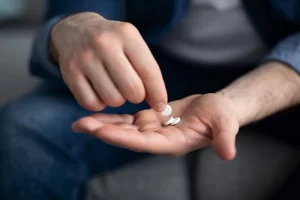Welcome to a journey of understanding the symptoms of fentanyl withdrawal – a challenging process that many individuals face. In this guide, we’ll explore what happens when someone who has been using fentanyl decides to stop. Why is this important? Because recognizing the signs of withdrawal early on can make a big difference in getting the right help.
Fentanyl is a strong pain-relieving medicine, but sometimes, people can become dependent on it. When they decide to quit, their bodies might react, and that’s what we call withdrawal. It’s like when you’ve been on a rollercoaster for a while, and suddenly it stops – your body feels a bit wonky.
But don’t worry, we’re here to help you understand what might happen during fentanyl withdrawal. Knowing the signs can be like having a map for a journey – it guides you in the right direction. So, let’s dive in and shed some light on this important topic.
Understanding Fentanyl and Withdrawal
Now, let’s talk about fentanyl – a strong medicine used for serious pain. But here’s the thing: if someone uses it a lot, their body can get used to it. It’s like when you always have your favorite snack – your body gets used to having it.
When someone decides to stop using fentanyl, their body might feel a bit confused. It’s like changing the usual routine – things can feel a bit different.
Fentanyl is powerful and helps a lot with pain. But when the body is used to it, stopping can lead to withdrawal. It’s not because someone did something wrong; it’s just the body reacting to the change.
Common Symptoms of Fentanyl Withdrawal
Alright, let’s talk about what might happen when someone decides to take a break from using fentanyl. Just like when you stop playing your favorite game, things can feel a bit different. Here are some signs – or signals – that the body might give:
Physical Signs:
- Upset Stomach: You might feel like your stomach is doing somersaults – a bit like the feeling you get on a bumpy ride.
- Aches and Pains: Your muscles might feel sore, like after a day of playing sports. It’s the body adjusting to the change.
- Feeling Too Hot or Too Cold: Imagine feeling like you’re in an oven or an ice cream freezer. Your body’s temperature can get a bit out of balance.
Emotional Signs:
- Feeling Anxious: It’s like when you have to give a speech in front of the class – that jittery feeling. Some folks might feel a bit anxious during fentanyl withdrawal.
- Mood Swings: Your mood can be a bit like a swing at the park – going back and forth. One moment you might feel okay, the next a bit down.
- Trouble Sleeping: Sleep might become a bit elusive. It’s like when you can’t find the right position to get comfy at night.
Remember, these signs aren’t something to be scared about. It’s just the body telling you it’s adjusting. If you notice these signals, reaching out to someone you trust or a professional can make a big difference.
Severe Withdrawal Symptoms and Complications
Now, let’s talk about what might happen if the body feels a bit more out of sorts during fentanyl withdrawal. It’s like when a simple cold turns into something more serious. Here are some signs that might need a bit more attention:
Serious Physical Signs:
- Heartbeat Skipping: It’s normal for your heart to beat, right? But during severe withdrawal, it might feel a bit irregular, like a skipping song on your playlist.
- Trouble Breathing: Breathing is usually easy, like a gentle breeze. But in severe cases, it might feel a bit more like a struggle, like blowing up a balloon that’s hard to inflate.
- Strong Cravings: Imagine really, really wanting your favorite snack. During severe withdrawal, cravings for fentanyl can be strong, and it’s important to get help.
Emotional Challenges:
- Deep Sadness or Hopelessness: Feeling down is okay sometimes, but if it gets really deep, like a well with no end, it’s crucial to reach out for support.
- Intense Anxiety or Panic: Like feeling super scared for no clear reason. It’s a bit like being in a haunted house – not a fun experience.
- Confusion: If thoughts start feeling like a jigsaw puzzle missing pieces, it’s important to let someone know. Clear thinking is like having all the puzzle pieces together.
Seeking Professional Assistance
So, what do you do if things feel a bit too much during fentanyl withdrawal? Well, it’s a bit like when you need help with a tricky homework question – you reach out to someone who knows what they’re doing. Here’s what you can do:
- Talk to a Doctor or Nurse: These are the health superheroes who know all about bodies and how they work. If you’re feeling unwell during fentanyl withdrawal, chatting with them is like getting a roadmap to feeling better.
- Reach Out to a Counselor or Therapist: These are like the emotion experts. If your feelings are all over the place, talking to a counselor is like having a guide through the emotional maze.
- Consider Support Groups: Sometimes, it helps to talk to others who have been through similar experiences. Support groups are like a team where everyone cheers each other on.
- Medications Can Help: In some cases, doctors might suggest medications to ease the tough parts of withdrawal. It’s a bit like using a tool to fix something that’s not working right.
- Explore Drug Rehab Centers for Drux Detox: For a more structured and supportive approach to fentanyl withdrawal, consider applying to drug rehab centers that offer specialized drug detox programs. These programs are designed to provide a comprehensive and safe environment for individuals navigating withdrawal. Much like a guided journey, drug detox programs in rehab centers can assist in managing the physical aspects of withdrawal, ensuring a smoother transition towards recovery. By seeking professional help within the structured setting of a drug rehab center, individuals can receive tailored care to address the challenges of fentanyl withdrawal and work towards lasting recovery.
Remember, asking for help is a strong move, not a weak one. It’s like having a teammate when you’re playing a game – together, things can be much easier.






